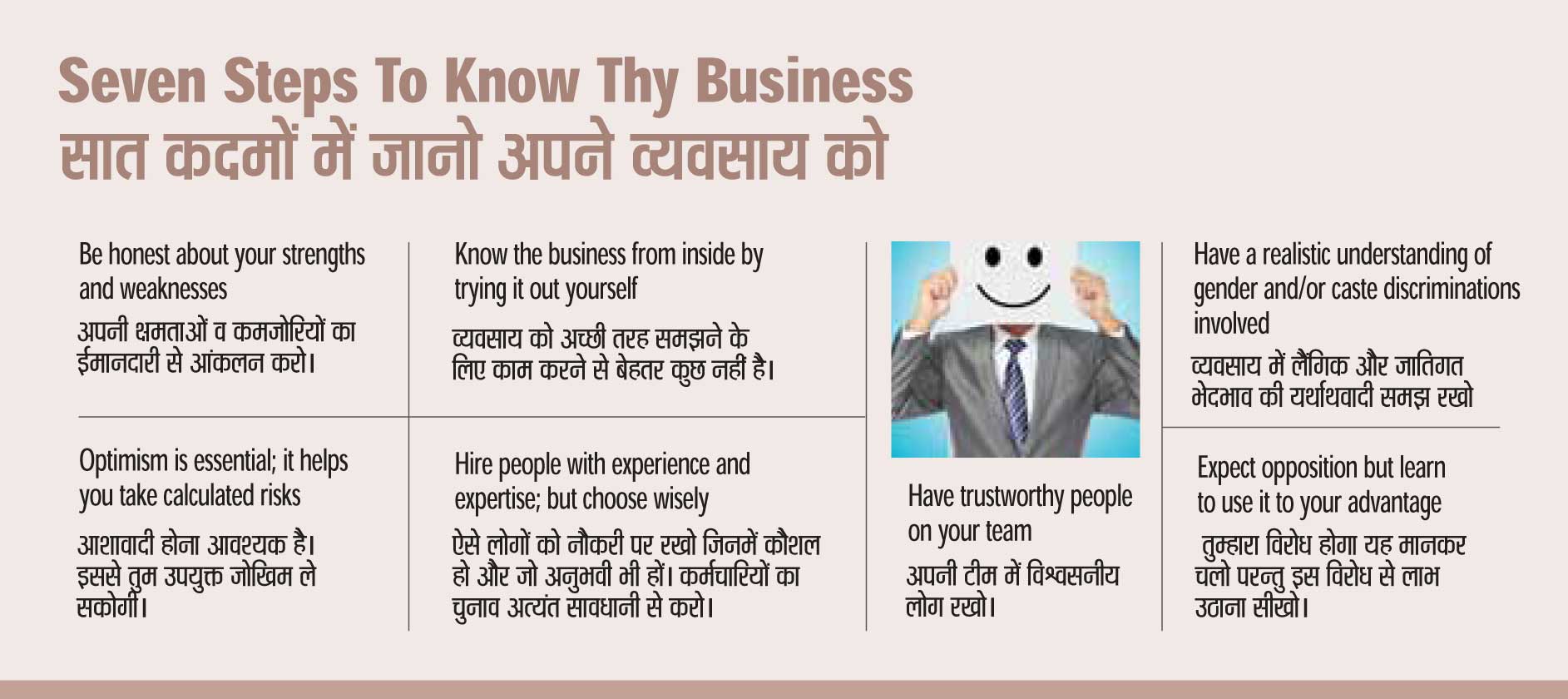Dear Dadu
Many thanks for your letter on market need, market size and competition. That was most helpful. I have now identified a business opportunity, where the market need is big enough and the market size is growing; of course, the competition is also growing, but I think I may be able to do a better job than many or even most of the competitors, at least in my part of town. At the same time, I don’t know the nitty-gritty of this business, so I am feeling not very confident! What to do?
Love,
Vinodini
Dear Vinodini,
It is always wise to be absolutely honest with yourself about strengths as well as weaknesses if you are going to go into business.
In your letter, you have indicated both your optimism about your ability to serve unmet needs, and your insecurity about starting in a business that you actually don’t know much about.
Optimism is essential in business, because business is about taking risks – and you won’t take risks if you are pessimistic. But business is not about taking risks in a foolhardy or ignorant way. Business is actually about understanding the risks in advance and finding ways to minimise them before actually taking the risk.
In your particular case, as you have identified the huge risk that comes from not knowing a business well from the inside, there are two main ways of minimising the risk.

The first way would be to go and learn about it yourself, perhaps by some kind of course in that field before sufficient practical experience with (if possible) the best of the existing businesses. The second way would be to hire people with the required knowledge and expertise. However, the problems with this course of action are two:
- How are you going to know whether the people who offer themselves as candidates to you are actually knowledgeable and experienced? In our country, we have too many people who appear to be knowledgeable but may not be as good as they appear.
- How are you going to find people who are trustworthy? They may or may not be trustworthy, but how would you know? There are different marks or characteristics of trustworthiness in different fields.
The two reasons I have given above are principally why I recommend the first course of action (learning about and gaining experience in the field yourself). Then, even if you don’t want to be very involved in the business, you will be able to make better decisions, as you will know at least a little about all the different aspects of the business.
Naturally, the best would be if you know the business thoroughly – and that is the reason why, in our traditions, one learnt about a trade or business from childhood, thanks to one’s parents. One started by doing the simplest things, even sweeping the floor, and went to learning about all the different aspects involved.

In your case, there are two additional aspects to be considered. First, you are a woman, and you need to think honestly about whether this is going to be an advantage or disadvantage in the business you wish to take up. That includes thinking about everything from the time of day or night you have to set off to work and return home, to the attitudes of customers, suppliers, and workers. In many businesses nowadays (particularly service businesses – especially in the big cities), your being a woman does not make much difference beyond the natural attractiveness that a woman has – though, of course, a woman is that much more vulnerable.
Second, you need to check how much of a disadvantage your caste background is going to be in this particular business and in your particular geographical location. Thanks to the impact of industrialisation and urbanisation, caste plays a smaller and smaller role in all businesses, whether manufacturing businesses or services businesses – but there are still huge pockets, even in our major cities, where caste discrimination is unfortunately strong even now. The only way to assess the level of caste-discrimination is by checking the existing pattern of contact across castes among your potential investors, employees, suppliers and customers.
You should also be aware that sentiment in relation to caste can still turn negative surprisingly quickly, particularly in times of economic, political or social stress. So, as soon as you can, ensure that you employ not only people of your own caste or “lower” castes but also people of “higher castes”, especially in those jobs that have most contact with outsiders – of course, if your business is, like FORWARD Press magazine, specifically meant for the Dalitbahujans, then it does not matter if you employ only Dalitbahujans at most levels (you will probably still find it helpful to have “upper” caste employees for contact with any “upper” caste investors).
It is, of course, possible that you feel called to break existing caste and gender taboos even if they exist in this particular business. If so, you must be prepared to face marginalisation, snide comments, mockery, laughter, outright persecution and discrimination against you in business. All that will add up to much slower progress in business, at least initially, unless you can turn all that into a PR advantage for your business and you. Opposition can certainly make you famous and that can, sooner or later, become an advantage in business, provided you continue to provide good products and services at a competitive quality and price, with a smile and with good humour.
Even without all such impediments, business is hard work. Whatever business you choose to go into, you have my admiration and support. But I’m sure there must be at least a few other things that you want to discuss before you decide to jump in to any business.
Love,
Dadu
Published in the September 2013 issue of the Forward Press magazine
Forward Press also publishes books on Bahujan issues. Forward Press Books sheds light on the widespread problems as well as the finer aspects of Bahujan (Dalit, OBC, Adivasi, Nomadic, Pasmanda) society, culture, literature and politics. Contact us for a list of FP Books’ titles and to order. Mobile: +917827427311, Email: info@forwardmagazine.in)
The titles from Forward Press Books are also available on Kindle and these e-books cost less than their print versions. Browse and buy:
The Case for Bahujan Literature
Dalit Panthers: An Authoritative History







